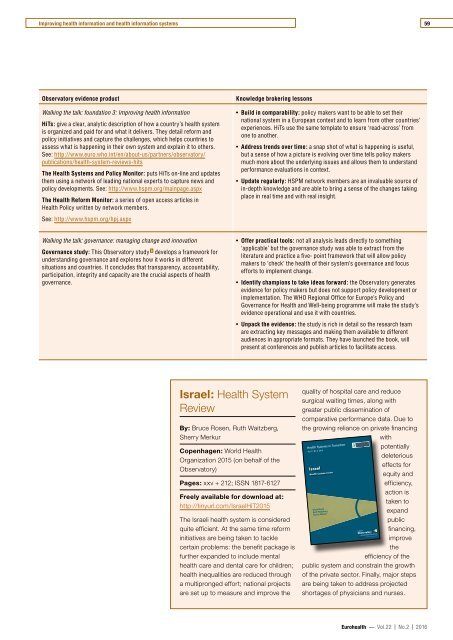EUROHEALTH
Eurohealth-volume22-number2-2016
Eurohealth-volume22-number2-2016
Create successful ePaper yourself
Turn your PDF publications into a flip-book with our unique Google optimized e-Paper software.
Improving health information and health information systems<br />
59<br />
Observatory evidence product<br />
Walking the talk: foundation 3: Improving health information<br />
HiTs: give a clear, analytic description of how a country’s health system<br />
is organized and paid for and what it delivers. They detail reform and<br />
policy initiatives and capture the challenges, which helps countries to<br />
assess what is happening in their own system and explain it to others.<br />
See: http://www.euro.who.int/en/about-us/partners/observatory/<br />
publications/health-system-reviews-hits<br />
The Health Systems and Policy Monitor: puts HiTs on-line and updates<br />
them using a network of leading national experts to capture news and<br />
policy developments. See: http://www.hspm.org/mainpage.aspx<br />
The Health Reform Monitor: a series of open access articles in<br />
Health Policy written by network members.<br />
See: http://www.hspm.org/hpj.aspx<br />
Knowledge brokering lessons<br />
• Build in comparability: policy makers want to be able to set their<br />
national system in a European context and to learn from other countries’<br />
experiences. HiTs use the same template to ensure ‘read-across’ from<br />
one to another.<br />
• Address trends over time: a snap shot of what is happening is useful,<br />
but a sense of how a picture is evolving over time tells policy makers<br />
much more about the underlying issues and allows them to understand<br />
performance evaluations in context.<br />
• Update regularly: HSPM network members are an invaluable source of<br />
in-depth knowledge and are able to bring a sense of the changes taking<br />
place in real time and with real insight.<br />
Walking the talk: governance: managing change and innovation<br />
Governance study: This Observatory study 8 develops a framework for<br />
understanding governance and explores how it works in different<br />
situations and countries. It concludes that transparency, accountability,<br />
participation, integrity and capacity are the crucial aspects of health<br />
governance.<br />
• Offer practical tools: not all analysis leads directly to something<br />
‘applicable’ but the governance study was able to extract from the<br />
literature and practice a five- point framework that will allow policy<br />
makers to ‘check’ the health of their system’s governance and focus<br />
efforts to implement change.<br />
• Identify champions to take ideas forward: the Observatory generates<br />
evidence for policy makers but does not support policy development or<br />
implementation. The WHO Regional Office for Europe’s Policy and<br />
Governance for Health and Well-being programme will make the study’s<br />
evidence operational and use it with countries.<br />
• Unpack the evidence: the study is rich in detail so the research team<br />
are extracting key messages and making them available to different<br />
audiences in appropriate formats. They have launched the book, will<br />
present at conferences and publish articles to facilitate access.<br />
Israel: Health System<br />
Review<br />
By: Bruce Rosen, Ruth Waitzberg,<br />
Sherry Merkur<br />
Copenhagen: World Health<br />
Organization 2015 (on behalf of the<br />
Observatory)<br />
Pages: xxv + 212; ISSN 1817-6127<br />
Freely available for download at:<br />
http://tinyurl.com/IsraelHiT2015<br />
The Israeli health system is considered<br />
quite efficient. At the same time reform<br />
initiatives are being taken to tackle<br />
certain problems: the benefit package is<br />
further expanded to include mental<br />
health care and dental care for children;<br />
health inequalities are reduced through<br />
a multipronged effort; national projects<br />
are set up to measure and improve the<br />
quality of hospital care and reduce<br />
surgical waiting times, along with<br />
greater public dissemination of<br />
comparative performance data. Due to<br />
the growing reliance on private financing<br />
with<br />
potentially<br />
deleterious<br />
effects for<br />
equity and<br />
efficiency,<br />
action is<br />
taken to<br />
expand<br />
public<br />
financing,<br />
improve<br />
the<br />
efficiency of the<br />
public system and constrain the growth<br />
of the private sector. Finally, major steps<br />
are being taken to address projected<br />
shortages of physicians and nurses.<br />
Health Systems in Transition<br />
Vol. 17 No. 6 2015<br />
Israel<br />
Health system review<br />
Bruce Rosen<br />
Ruth Waitzberg<br />
Sherry Merkur<br />
Eurohealth — Vol.22 | No.2 | 2016
















